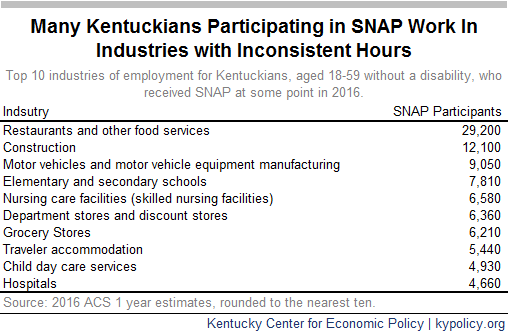SNAP works for Kentuckians of all ages, including older people in our communities. For decades, the Supplemental Nutrition Assistance Program (SNAP) has helped Kentuckians over 50 with their grocery bills. However, the proposed 2018 Farm Bill would put that assistance at risk for many. According to the Congressional Budget Office, 1.2 million Americans up to age 59 will lose SNAP by 2028.
The major way the Farm Bill would take nutrition assistance away from Kentucky seniors is through unprecedented changes to an already harmful eligibility standard. Currently, non-disabled adults up to 49 years old who do not have children under 18 must work or do some form of job training for 20 hours per week in order to receive SNAP. This requirement, though misguided and dangerous, has been in effect since the 1996 welfare reform law. The Farm Bill, however, would raise the age limit from 49 to 59 years old and exempt parents only if their children are under 6 years old. By 2026, that weekly requirement rises to 25 hours per week, meaning those who fail to work 25 hours per week or to properly document that work would lose SNAP. Though some in this age range – who are either disabled themselves or care for disabled family members – may qualify for an exemption, the process of proving it may lead to people falling through the cracks. Census data shows that nearly 45,000 non-disabled Kentuckians aged 50-59 used SNAP at some point in 2016.
The proposal makes it easier to lose and harder to regain SNAP benefits. Currently, SNAP participants can continue to use food assistance for up to 3 months in any 36-month period that they don’t meet the work requirement. Furthermore, they can reinstate benefits by meeting the requirements at any time. The new law would require participants to prove on a monthly basis (compared to the current 6 months) that they meet the 20-25 hour per week requirement and would lock them out of benefits for 12 months the first month they fail to meet the requirement. Each subsequent failure would result in a 3-year lock out from SNAP. For people already struggling to make ends meet, taking away food assistance for even a short time could be devastating, let alone three years of food insecurity.
This strict monthly reporting is dangerous for all working Kentuckians who use SNAP to help make ends meet, but it’s especially dangerous for low-wage older workers. There are unique challenges for older Kentuckians when it comes to being hired into new positions, including restaurants, hotels and construction where employers are hesitant to hire older workers they might have to pay more due to experience, for example. Many low-wage working SNAP recipients aged 50 to 59 are in households that experience periods of joblessness; and even for those who work consistently but whose employers provide too few hours – to which older Kentuckians are particularly vulnerable — the Farm Bill will lead to long periods of food insecurity. Working Kentuckians who participate in SNAP are often employed in industries where hours can be especially inconsistent and inadequate, as shown in the table below.
The Farm Bill would also require legal guardians and parents to pursue child support enforcement from non-custodial parents as a condition of receiving food assistance. Some older Kentuckians who are raising children or grandchildren but struggle to pursue child support enforcement, for any number of reasons, could also be kept from participating in SNAP.
Of the estimated 1.2 million fewer SNAP participants nationwide, 324,000 adults age 50 to 59 would no longer receive SNAP due primarily to the increased upper age limit of the work requirement. The remaining 744,000 are those who live in households with children over 6 years old and who would lose SNAP due to the change in the age of the caretaking exemption, a population that includes those aged 50-59. The remainder of those losing benefits are those age 18-49. Food insecurity could increase for additional older Kentuckians who live in households where other recipients lose benefits and there is a smaller food budget overall.
Punishing Kentuckians who have inconsistent work hours, experience spells of joblessness, are disabled, live in economically distressed regions, or whose caretaking responsibilities keep them from the required level of paid employment is unduly harsh and will result in perhaps tens of thousands of older Kentuckians needing to skimp at the grocery store, or choose between food and other necessities like medicine. Kentucky’s congressional delegates must protect and preserve SNAP by rejecting the cuts to food assistance in the proposed Farm Bill.




